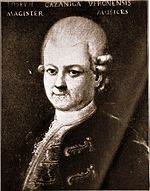- Don Giovanni Tenorio
-
Operas by Giuseppe Gazzaniga 
Il barone di Trocchia (1768)
Don Giovanni Tenorio (1787)
Martino Carbonaro (1801)Don Giovanni Tenorio, o sia Il convitato di pietra[1] (English: Don Giovanni Tenorio, or The Stone Guest) is the most famous opera by the Italian composer Giuseppe Gazzaniga. It belongs to the genre of dramma giocoso and is in one act. Don Giovanni Tenorio was first performed at the Teatro San Moisè, Venice, on February 5, 1787. The libretto, by Giovanni Bertati, is based on the legend of Don Juan, leading to comparisons with Mozart's Don Giovanni, which had its premiere later in 1787. Mozart's librettist, Lorenzo Da Ponte, certainly knew the earlier opera. Gazzaniga's work is much shorter than Mozart's, however, and originally formed part of a double-bill with another piece, Il capriccio drammatico.
Contents
Roles
- Don Giovanni (tenor)
- Pasquariello, Don Giovanni's manservant (bass)
- The Commendatore (bass)
- Donna Anna, the Commendatore's daughter (soprano)
- Duca Ottavio, Donna Anna's fiancé (tenor)
- Donna Elvira, a former lover of Don Giovanni (soprano)
- Donna Ximena (soprano)
- Biagio, a peasant (bass)
- Maturina, Biagio's fiancée (soprano)
- Lanterna, Don Giovanni's cook (tenor)
Synopsis
With his manservant Pasquariello keeping watch outside, Don Giovanni attempts to seduce Donna Anna. Donna Anna's father, the Commendatore, challenges Giovanni to a duel and is killed. Ottavio, Anna's fiancé, swears vengeance. Meanwhile Don Giovanni encounters his old lover. Donna Elvira. As Don Giovanni woos Donna Ximena, Pasquariello gives Elvira a detailed account all his master's amorous conquests. Maturina and Biagio, accompanied by a party of peasants, arrive. Maturina and Biagio are about to be married, but Don Giovanni chases off a furious Biagio and attempts (unsuccessfully) to seduce Maturina.
Don Giovanni and Pasquariello follow Ottavio when he visits the Commendatore's tomb. Pasquariello is terrfied when he hears the statue accept an invitation to dinner. Later that evening at Don Giovanni's house, Elvira pleads with the Don to mend his ways. She leaves when he refuses. Giovanni and Pasquariello enjoy their dinner and sing the praises of food, wine, and Venetian women. The statue suddenly arrives and drags Don Giovanni to his death. Ottavio and the women enter. Pasquariello and Lanterna describe Giovanni's fate to them. The opera ends as all rejoice at his downfall.
Recordings
Gazzaniga: Don Giovanni – Orchestra e coro della RCA Italiana
- Conductor: Herbert Handt
- Principal singers: Laerte Malagutti, Alfonso Nanni, James Loomis, Maria Minetto, Luciana Ticinelli-Fattori
- Recording date: ?
- Label: Nuova Era (CD)
Gazzaniga: Don Giovanni – Kammerchor Stuttgart, Tafelmusik Baroque Orchestra
- Conductor: Bruno Weil
- Principal singers: Douglas Johnson, Luciana Serra, Elzbieta Szmytka, Edith Schmid-Lienbacher, Ferruccio Furlanetto, Carlo Allemanno
- Recording date: 1991
- Label: Sony Vivarte (CD) SK 46693
Sources
- ^ "Don Giovanni (i)" by Mary Hunter, The New Grove Dictionary of Opera, ed. Stanley Sadie (subscription required) gives: Don Giovanni, o sia Il convitato di pietra and Don Giovanni Tenorio
- Amadeus Almanac
- Viking Opera Guide, ed. Holden (Viking, 1993)
External links
Categories: Italian-language operas | Drammi giocosi | 1787 operas | Operas | One-act operas | Operas by Giuseppe Gazzaniga | Works based on the Don Juan legend
Wikimedia Foundation. 2010.
